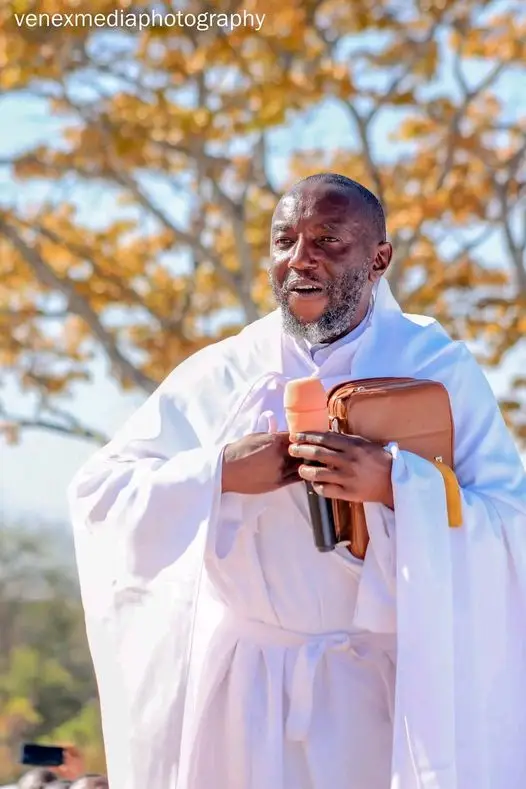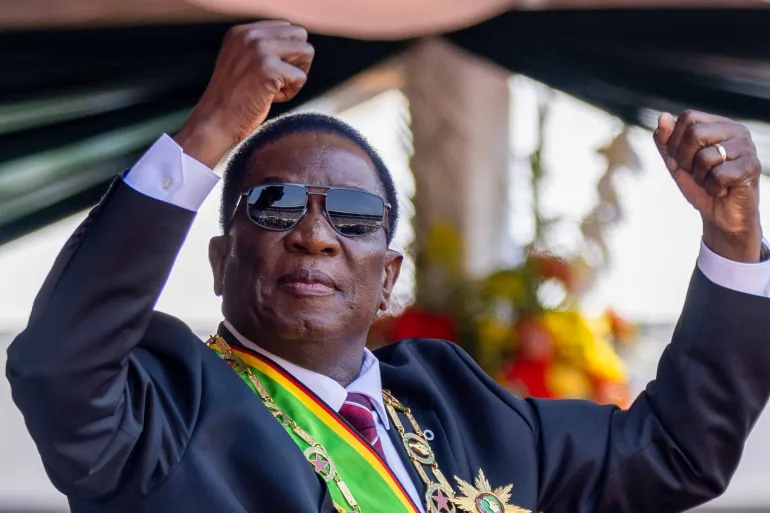The African Apostolic Church, founded by the venerable Paul Mwazha, is a significant religious institution in Zimbabwe and beyond, recognized for its unique blend of Christian doctrine and traditional African customs. Over the years, the church has grown into a spiritual home for many, but the twilight of its founder’s life has seen it splinter into three factions, each vying for control and legitimacy. This division has brought to the fore issues of succession, power struggles, and legal battles that has irrevocably dismantled the unity of the church.

The Genesis of the Conflict
Paul Mwazha, often referred to as “Mutumwa” (The Apostle), built The African Apostolic Church on a foundation of spiritual guidance and African tradition. His leadership, deeply rooted in his interpretation of Christianity, made him a revered figure. However, as Mwazha aged, questions regarding succession began to surface, leading to the current factionalism that has gripped the church.
The succession crisis became more pronounced when Mwazha’s health deteriorated, creating a vacuum that his sons and other church leaders sought to fill. This vacuum has resulted in the emergence of three distinct factions:
- Ngoni Edward Mwazha’s Faction
- Alfred Kushamisa Mwazha’s Faction
- Tawanda Mwazha and the Board of Trustees’ Faction
Factional Strife in The African Apostolic Church: A Detailed Analysis
The African Apostolic Church, founded by the venerable Paul Mwazha, is a significant religious institution in Zimbabwe and beyond, recognized for its unique blend of Christian doctrine and traditional African customs. Over the years, the church has grown into a spiritual home for many, but the twilight of its founder’s life has seen it splinter into three factions, each vying for control and legitimacy. This division has brought to the fore issues of succession, power struggles, and legal battles that now threaten the unity of the church.
The Genesis of the Conflict
Paul Mwazha, often referred to as “Mutumwa” (The Apostle), built The African Apostolic Church on a foundation of spiritual guidance and African tradition. His leadership, deeply rooted in his interpretation of Christianity, made him a revered figure. However, as Mwazha aged, questions regarding succession began to surface, leading to the current factionalism that has gripped the church.
The succession crisis became more pronounced when Mwazha’s health deteriorated, creating a vacuum that his sons and other church leaders sought to fill. This vacuum has resulted in the emergence of three distinct factions:
- Ngoni Edward Mwazha’s Faction
- Alfred Kushamisa Mwazha’s Faction
- Tawanda Mwazha and the Board of Trustees’ Section
Ngoni Edward Mwazha’s Faction
Ngoni Edward Mwazha, Paul Mwazha’s eldest son, is a controversial figure within the church. His polygamous background, influenced by his time in the Johane Marange Apostolic Church, a sect known for its strict traditional practices, set him apart from the church’s orthodox followers. Despite being the eldest, his leadership was not universally accepted, especially given his polygamous status, which conflicted with the teachings of the African Apostolic Church.
Ngoni’s ascendancy to leadership came through a combination of assertive actions and influence, eventually usurping control from his younger brother, Alfred Kushamisa Mwazha. This move was contentious, as it disregarded the church’s traditional line of succession and the wishes of many members, leading to a significant rift.
Alfred Kushamisa Mwazha’s Faction
Alfred Kushamisa Mwazha, the younger son, was seen by many as the rightful successor to Paul Mwazha. His leadership style, perceived as more aligned with the church’s founding principles, gained him a substantial following. However, the internal power struggle with his elder brother, Ngoni, forced Alfred to eventually break away and establish his own faction.
Alfred’s faction, though initially part of the main church, was compelled to move out due to the growing tensions and the need to preserve the sanctity of their worship. They have since started to establish new shrines, notably at Chivavarira, just across the Shashi River, and at Chirasauta, signifying their independence and resilience.
Tawanda Mwazha and the Board of Trustees’ Faction
The third faction, which has emerged as the most legally robust, is led by Tawanda Mwazha, the youngest son of Paul Mwazha, in conjunction with the church’s board of trustees. This faction claims legitimacy through the church’s legal structures and has been the primary victor in the numerous court battles that have ensued. To add more to their control, it is this group, that has unhindered access to the church Founder, with it’s priest Tawanda being regarded as a darling son of the founder. This stems from an incident in South Africa where Mwazha told congregants that Tawanda is the one with his spiritual inheritance from among all his sons. Tawanda was also once prophesied by Ngoni Mwazha at Nswazi Shrine in Matebeleland, that holy rays from the church founder where beaming on his face.
Tawanda’s leadership, supported by the board chairperson, Chiseko, has been characterized by a strong adherence to the legal framework governing the church. This faction currently holds control over all the church’s shrines and properties, having successfully barred Ngoni’s faction from using these sacred sites without permission.
Legal Battles and Physical Confrontations
The factional conflict has not only played out in spiritual and communal settings but has also been a significant feature in Zimbabwe’s courts. Tawanda’s faction has won numerous legal battles, solidifying their control over the church’s assets, including the shrines. The courts have consistently ruled in favor of Tawanda’s faction, emphasizing their legal right to manage the church’s properties.
However, despite these legal victories, Ngoni’s faction has resorted to using force to assert control over the church’s shrines. This has led to physical confrontations, particularly at the Ndarikure Shrine in Chirumhanzi. In a bid to prevent Ngoni’s faction from holding a church conference at the shrine, Tawanda’s faction undertook the drastic measure of razing down the toilets and closing the shrine for renovations, coincidentally during the period Ngoni’s faction planned to use it.
The 2024 Battle Over Ndarikure Shrine

The ongoing dispute over the Ndarikure Shrine in 2024 exemplifies the intense struggle between the factions. Tawanda’s faction, leveraging their legal authority, initiated renovations at the shrine by razing down all existing toilets, rendering the shrine unusable. This move, while legally justified, has been viewed by many as a strategic attempt to block Ngoni’s faction from holding their planned conference at the same site.
The escalating tensions over the Ndarikure Shrine have forced Ngoni’s faction to alter their plans for the 2024 conference. Unable to use the shrine due to the renovations initiated by Tawanda’s faction, Ngoni’s group has been compelled to change the venue. They will now hold their conference at a new location, Chitando, which they have renamed Maungwa, presumably to avoid legal hurdles associated with their previous plans. This move symbolizes their determination to continue their spiritual activities despite the ongoing challenges.
Ngoni’s faction, which had already faced legal barriers in using the shrine, found this action particularly frustrating, as it coincided precisely with their plans to gather there. The timing of the renovations has fueled speculation and tension, with Ngoni’s supporters accusing Tawanda’s faction of deliberately sabotaging their event. Legally, Tawanda’s faction remains within their rights, having the court’s blessings to manage the shrine as they see fit, but the move has escalated the conflict, highlighting the deep divisions and the lengths each side is willing to go to assert control.
The Future of The African Apostolic Church
The ongoing factional struggle within The African Apostolic Church has not only caused division but has also raised critical questions about the future of the church. While Tawanda’s faction currently holds the legal upper hand, the persistence of Ngoni’s faction and the establishment of new shrines by Alfred’s faction indicate that reconciliation might be challenging.
The church, once united under the charismatic leadership of Paul Mwazha, now faces an uncertain future, with its members divided across different factions. The potential for reconciliation remains, but it will require humility, dialogue, and a return to the spiritual principles that Paul Mwazha espoused.
As it stands, the factions continue to operate independently, with Tawanda’s faction maintaining legal control, Alfred’s faction building its own identity, and Ngoni’s faction pushing against the boundaries set by the courts. The resolution of this conflict will likely shape the church’s trajectory for years to come, impacting not only its followers but also the broader religious landscape in Zimbabwe.





